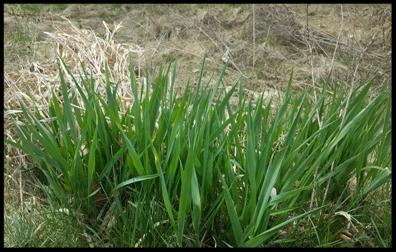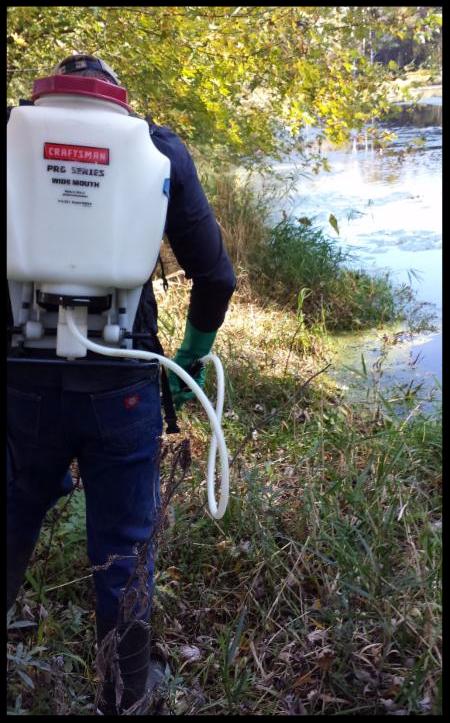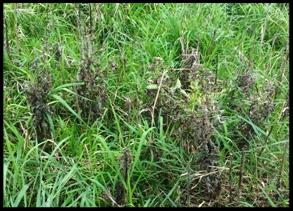Battling Alien Invaders on the Restoration Front
What exactly are we talking about? Funny looking green guys popping out of silver flying saucers? Or perhaps, alien parasites creating hordes of killer zombies? No, alien invaders is a fairly common term that is used in natural resources management to refer to non-native weedy plant species. This is an impassioned phrase that signifies a real big problem. For instance, reed canary grass and Canada thistle create major headaches for us in Minnesota and fall under this attention-getting terminology.

Because of this feeling that something terrifying is taking over our territory, whether that be croplands or natural areas, herbicide companies are known to play into this and use interesting names to market their products. Here are just a few attention-grabbing herbicide product names that relate to conflict, strife, and our great nation:
Broadstrike, Freedom, Pummel, Guardsman, Acquire, Ramrod, Rescue, Stealth, and Liberty
. Does this get you charged up and ready to go out and kick some rear end?
Throughout our company's history, Natural Shore has made an effort to stay up-to-date on new or different maintenance practices that will benefit Minnesota's landscapes. We are very proud of the fact that we use herbicides judiciously and conservatively. We are very passionate about knocking back the alien invaders, but we believe we do it the right way by limiting herbicide use and always look for alternatives when possible.
Here are a few strategies we use to curb our herbicide use and improve our natural areas:
1. Before you pick up that herbicide container,
consider your environmental conditions. For instance, it might be too windy, too hot, too cold, or too wet for herbicides to be effective. In that case, we rely on the tried, tested, and true strategy of hand pulling or sometimes weed whipping (depending on the species). These methods might be more grueling on a hot, humid Minnesota summer day, but our crew just buckles down, hustles, and gets the work done!
2. It's critical to time herbicide treatments so that  your target alien species are the most vulnerable. It is important to realize that there are specific times of year when it makes sense to treat certain invasive plant species. For instance, early spring is a great time to treat cool season invasive weed species, especially in areas with still dormant warm season native plant species. This approach limits the "collateral damage" (yes another war term). Fall is a time when plants are storing nutrients in their root systems, and it is most effective to treat certain species this time of year. At Natural Shore, we severely limit our herbicide use during the summer months.
your target alien species are the most vulnerable. It is important to realize that there are specific times of year when it makes sense to treat certain invasive plant species. For instance, early spring is a great time to treat cool season invasive weed species, especially in areas with still dormant warm season native plant species. This approach limits the "collateral damage" (yes another war term). Fall is a time when plants are storing nutrients in their root systems, and it is most effective to treat certain species this time of year. At Natural Shore, we severely limit our herbicide use during the summer months.
3. Know your enemy and choose the correct herbicide. There are many different herbicides available today that help manage alien invasive weeds. Many have specific chemical properties that make them more effective on certain species of plants while being entirely ineffective on other types of plants. It is extremely important to know which herbicides will be most effective in your management effort. Having a detailed understanding of which chemicals to use in different situations allows maximum efficiency. It is also important to alternate different types of herbicides so that certain weed species do not become "immune" or resistant to the chemicals. If we use too much of just one type of chemical, that chemical will gradually become more and more ineffective, resulting in even more chemical use. By using different chemicals you can help avoid this immunity and preserve herbicide effectiveness.

4. Keep detailed records of herbicide use and its success. We keep records of all of our herbicide treatments. These records include time, date, temperature, wind speed, wind direction, target species, chemical type, chemical concentration, amount used, and other information. These records along with field observations taken during subsequent maintenance visits allow us to track herbicide effectiveness.
5. Stay informed on new research, innovative technologies, improved chemical formulas, and fresh life history information on your target invasive alien plant species.
If you would like for us to take over your ecological restoration maintenance, our crew would be happy to combat those alien invaders! Our lead maintenance supervisor, Tracy, has over 10 years of field maintenance experience and will help you do battle in your restoration.